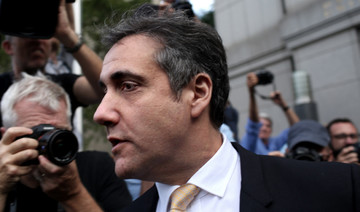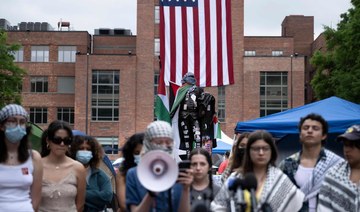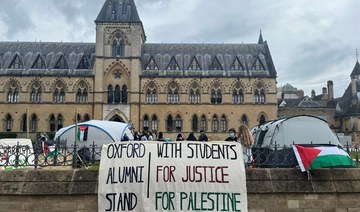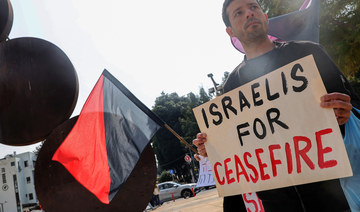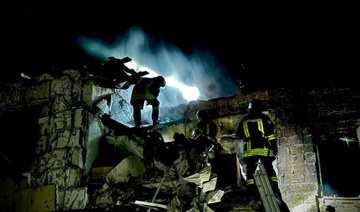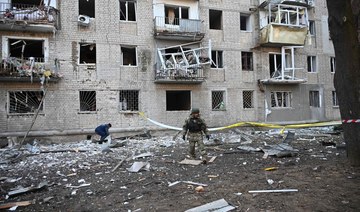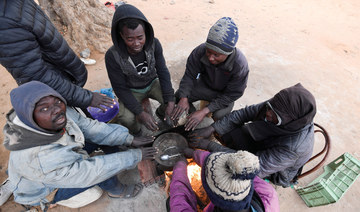NEW YORK: Mired in financial woes, Michael Cohen is sticking his hand out and asking the public for help paying for his legal defense, and one anonymous donor already has ponied up $50,000.
Through his lawyer, Donald Trump’s former “fixer” says collecting contributions through a GoFundMe page set up after his guilty plea this week is the only way to ensure the truth comes out about the president.
It’s also the latest sign that Cohen is broke.
Trump’s former personal lawyer owes at least $1.4 million to the IRS after pleading guilty Tuesday to tax evasion, campaign finance violations and bank fraud, and has racked up millions of dollars in debt. Because of his plea, he’s being forced to give up his New York City taxi medallions, which have shrunk in value as Uber and Lyft shake up the industry.
“He’s without resources and owes a lot of money,” Cohen’s lawyer, Lanny Davis, said in a battery of television interviews on Wednesday.
Cohen, who once said he would “take a bullet” for Trump, commented in court on Tuesday that Trump directed him to arrange payments of $130,000 to porn star Stormy Daniels and $150,000 to former Playboy model Karen McDougal to buy their silence about alleged affairs before the election.
While Trump denies the affairs, his account of his knowledge of the payments has shifted. In April, Trump denied he knew anything about the Daniels payment. He told Fox News in an interview aired Thursday that he knew about payments “later on.”
By Thursday afternoon, the GoFundMe page dubbed the “Michael Cohen Truth Fund” had raised more than $145,000 from about 2,600 donations. Most reaction on social media was incredulous and unsympathetic, but one $5 donor was encouraging, writing: “The USA would love you for your honesty.”
Confusion over the web address for the fundraising page, michaelcohentruthfund.com , led someone on Wednesday to anonymously register a shorter version, michaelcohentruth.com , that redirects to Trump’s re-election campaign website.
Cohen’s crowdfunding campaign, which has a goal of raising $500,000, could be a way for Cohen to bolster his whistleblower status by appealing to Democrats and others who want to see Trump taken down.
It’s not the first time someone who felt wronged by Trump has asked the public to pony up. Fired former FBI deputy director Andrew McCabe raked in more than $500,000 in just five days of his legal defense campaign, and Daniels funded her lawsuit against the president with about $500,000 raised from nearly 17,000 donors.
Cohen could ultimately need much more to wipe his books clean.
Court papers filed in connection with Cohen’s guilty plea detailed his precarious financial state, as well as his side gigs as a taxicab magnate, high-interest lender and broker of real estate and handbag deals.
In one arrangement, according to the papers, Cohen used a line of credit he obtained at 5 percent interest to float a $6 million loan to a Chicago taxi operator at 12 percent interest.
Later, when applying for the $500,000 home equity credit line used to finance the Daniels payment, the papers say Cohen failed to disclose $14 million in medallion-related debt. Cohen and his wife claimed on the loan paperwork that they had a positive net worth of more than $40 million.
In April, transaction records show, Cohen put up his multimillion-dollar Trump Park Avenue home — valued at $9 million — as collateral on some of his taxi-related loans.
The value of medallions, the physical plates affixed to cabs that owners are required to display, have dropped precipitously in recent years from highs of over $1 million apiece in New York just a few years ago to nearly a quarter of that amount today.
Cohen has been involved in the gritty New York City yellow cab industry since the 1990s. He’s owned about 30 medallions with his wife and father-in-law, as well as a fleet of 22 cabs in Chicago, records show. Some of them are held through companies with names such as Love Bug Cab Corp. and Tailgater Cab Corp.
In addition to his Trump and taxi work, the court papers say Cohen made $100,000 in 2014 for brokering the sale of a piece of property in a Florida aviation community and $30,000 in 2015 for brokering the sale of a Birkin bag, a highly coveted French handbag.
Davis, who is listed as the creator of Cohen’s fundraising page, told The Associated Press last month that Cohen was footing the bill for his defense after pivoting from loyalty to Trump to looking out for himself, but was “thinking of trying to get some help.”
A description on the GoFundMe page describes it as a “transparent trust account, with all donations going to help Michael Cohen and his family” as he goes forward with telling the truth about Trump.
Loyola Law School professor Jessica Levinson said crowdfunding campaigns raise ethical concerns because they allow people to contribute to a political cause similarly to a campaign contribution, but without the same transparency and regulation.
“Who does the lawyer and client feel grateful to?” Levinson said. “Right now, there is no clear way of finding out.”
GoFundMe no longer allows fundraisers to download a list of donor’s information such as email addresses, citing new data protection regulations. Fundraisers can communicate with donors through the GoFundMe site. And although there is an option to make donations appear anonymously on the public-facing part of the website, it appears that the fundraiser can still view the name of these donors.
GoFundMe did not immediately reply to a request for comment.
The money also could add to Cohen’s already sizeable tax bill.
Robert Rizzi, a lawyer specializing in tax and government ethics, said the law is unclear whether Cohen would have to pay taxes on the fundraising proceeds. Taxes would apply if the money counts as income, but not if it’s a gift — but gifts must be given “out of detached and disinterested generosity,” Rizzi said.
“There would be an irony in being taxed on money he raised to defend himself for tax evasion,” Rizzi said.
Pawn to pauper: Broke Trump foe Cohen crowdfunds legal bills
Pawn to pauper: Broke Trump foe Cohen crowdfunds legal bills

- Trump’s former personal lawyer owes at least $1.4 million to the IRS after pleading guilty Tuesday to tax evasion, campaign finance violations and bank fraud, and has racked up millions of dollars in debt
- ohen has commented in court that Trump directed him to arrange payments to two women to buy their silence about alleged affairs before the 2016 US election
Defense team says 9 Egyptians accused of causing deadly shipwreck misidentified as crew

- Adriana, an overcrowded fishing trawler, sank on June 14 off southeastern coast of Greece
- Only 104 survived out of 500-700 Pakistanis, Egyptians, Syrians and Palestinians aboard ship
ATHENS, Greece: The legal defense team for nine Egyptian men due to go on trial in southern Greece next week accused of causing one of the Mediterranean’s deadliest shipwrecks said Thursday they will argue that Greece has no jurisdiction in the case, and insisted their clients were innocent survivors who have been unjustly prosecuted.
The nine, whose ages range from early 20s to early 40s, are due to go on trial in the southern city of Kalamata on May 21 on a series of charges, including migrant smuggling, participation in a criminal organization and causing a deadly shipwreck. They face multiple life sentences if convicted.
The Adriana, an overcrowded fishing trawler, had been sailing from Libya to Italy with hundreds of asylum-seekers on board when it sank on June 14 in international waters off the southwestern coast of Greece.
The exact number of people on board has never been established, but estimates range from around 500 to more than 700. Only 104 people survived — all men and boys from Syria, Egypt, Pakistan and two Palestinians — and about 80 bodies were recovered.
The vessel sank in one of the Mediterranean’s deepest areas, making recovery efforts all but impossible.
The Greek lawyers who make up the defense team spoke during a news conference in Athens on Thursday. They maintained their clients’ innocence, saying all nine defendants had been paying passengers who had been misidentified as crew members by other survivors who gave testimonies under duress just hours after having been rescued.
The nine “are random people, smuggled people who paid the same amounts as all the others to take this trip to Italy aiming for a better life, and they are accused of being part of the smuggling team,” lawyer and defense team member Vicky Aggelidou said.
Dimitris Choulis, another lawyer and member of the legal team, said that Greek authorities named the defendants as crew members following testimonies by nine other survivors who identified them for having done things as simple as handing bottles of water or pieces of fruit to other passengers.
“For nearly a year now, nine people have been in prison without knowing what they are in prison for,” Choulis said.
“For me, it is very sad to visit and see people in prison who do not understand why they are there,” he added.
While the Adriana was sailing in international waters, the area was within Greece’s search and rescue zone of responsibility. Greece’s coast guard had been shadowing the vessel for a full day without attempting a rescue of those on board. A patrol boat and at least two merchant ships were in the vicinity when the trawler capsized and sank.
In the aftermath of the sinking, some survivors said the coast guard had been attempting to tow the boat when it sank, and rights activists have accused Greek authorities of triggering the shipwreck while attempting to tow the boat out of Greece’s zone of responsibility.
Greek authorities have rejected accusations of triggering the shipwreck and have insisted the trawler’s crew members had refused to accept help from the nearby merchant ships and from the Greek coast guard.
A separate investigation being carried out by Greece’s naval court hasn’t yet reached any conclusion, and the defense team hasn’t been given any access to any part of it.
The Egyptians’ defense team also argues that because the shipwreck occurred in international waters, Greek courts don’t have jurisdiction to try the case, and the defense will move to have the case dismissed on those grounds when the trial opens in Kalamata next week.
Greece lies along one of the most popular routes into the European Union for people fleeing war and poverty in the Middle East, Africa and Asia. While most of those cross into the country’s eastern Aegean Sea islands from the nearby Turkish coast, others try to skirt Greece altogether and head from north Africa to Italy across the longer and more dangerous Mediterranean route.
On Thursday, Greece’s coast guard said that 42 people had been rescued and another three were believed to be missing after a boat carrying migrants sent out a distress call while sailing south of the Greek island of Crete.
Officials said they were alerted by the Italian coast guard overnight about a boat in distress 27 nautical miles (31 miles or 50 kilometers) south of Crete. Greece’s coast guard said that 40 people were rescued by nearby ships, and another two were rescued by a Greek navy helicopter.
A search and rescue operation was underway for three people reported by survivors as still missing. It wasn’t immediately clear what kind of vessel the passengers had been on, or why the boat sent out a distress call.
Police dismantle pro-Palestinian encampment at DePaul University in Chicago

- All of the protesters at the encampment “voluntarily left” the area when police arrived early Thursday
- The move to clear the campus comes less than a week after the school’s president said public safety was at risk
CHICAGO: Police began dismantling a pro-Palestinian encampment early Thursday at DePaul University in Chicago, hours after the school’s president told students to leave the area or face arrest.
Officers and workers in yellow vests cleared out tents and camping equipment at the student encampment, leaving behind yellow squares of dead or dying grass where the tents had stood. Front-loaders were being used to remove the camping equipment.
Just across the street from where the encampment was spread across a grassy expanse of DePaul’s campus known as “The Quad,” a few dozen protesters stood along a sidewalk in front of a service station, clapping their hands in unison as an apparent protest leader paced back and forth before them, speaking into a bullhorn.
All of the protesters at the encampment “voluntarily left” the area when police arrived early Thursday, said Jon Hein, chief of patrol for the Chicago Police Department.
“There were no confrontations and there was no resistance,” he said at a news briefing. “As we approached, all the subjects voluntarily left the area.”
Hein said, however, that two people, a male and female in their 20s, were arrested outside the encampment “for obstruction of traffic.”
The move to clear the campus comes less than a week after the school’s president said public safety was at risk.
The university on Saturday said it had reached an “impasse” with the school’s protesters, leaving the future of their encampment on the Chicago campus unclear. Most of DePaul’s commencement ceremonies will be held the June 15-16 weekend.
In a statement then, DePaul President Robert Manuel and Provost Salma Ghanem said they believe that students intended to protest peacefully, but “the responses to the encampment have inadvertently created public safety issues that put our community at risk.”
Efforts to resolve the differences with DePaul Divestment Coalition over the past 17 days were unsuccessful, Manuel said in a statement sent to students, faculty and staff Thursday morning.
“Our Office of Public Safety and Chicago Police are now disassembling the encampment,” he said. “Every person currently in the encampment will be given the opportunity to leave peacefully and without being arrested.”
He said that since the encampment began, “the situation has steadily escalated with physical altercations, credible threats of violence from people not associated with our community.”
Students at many college campuses this spring set up similar encampments, calling for their schools to cut ties with Israel and businesses that support it, to protest lsrael’s actions in the war with Hamas. The protests began as schools were winding up their spring semesters and are now holding graduation ceremonies.
Separately, some students and faculty were detained Wednesday after police removed an encampment and pro-Palestinian protesters briefly took over a lecture hall at the University of California, Irvine. There was a large law enforcement response when demonstrators demanding the university divest from Israel blocked the building’s entrance with a makeshift barricade. Police declared an unlawful assembly, cleared the building and took an unknown number of people into custody.
Also Wednesday, 11 members of a group protesting at the University of Tennessee in Knoxville who did not vacate the area despite repeated warnings were arrested for trespassing, the university said in a statement. Those arrested included three students and eight people who are not affiliated with the university. Any students who were arrested will also be referred to student conduct, officials said.
“The University of Tennessee respects individual’s rights to free speech and free expression and is committed to managing the campus for all,” the university said in the statement. “We will continue to be guided by the law and university policy, neutral of viewpoint.”
Tensions at DePaul flared the previous weekend when counterprotesters showed up to the campus in the city’s Lincoln Park neighborhood and prompted Chicago police to intervene.
The student-led DePaul Divestment Coalition, who are calling on the university to divest from Israel, set up the encampment April 30. The group alleged university officials walked away from talks and tried to force students into signing an agreement, according to a student statement late Saturday.
“I don’t want my tuition money to be invested in my family’s suffering,” Henna Ayesh, a Palestinian student at DePaul and Coalition member, said in the statement.
DePaul is on the city’s North Side. Last week, police removed a similar encampment at the University of Chicago on the city’s South Side.
The Associated Press has recorded at least 79 incidents since April 18 where arrests were made at campus protests across the US More than 2,900 people have been arrested on the campuses of 60 colleges and universities. The figures are based on AP reporting and statements from universities and law enforcement agencies.
South Africa tells UN court Israel ‘genocide’ hit ‘new and horrific stage’
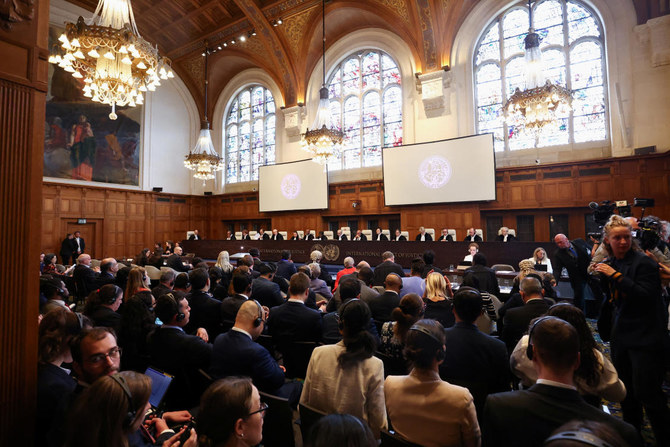
- ICJ heard a litany of allegations against Israel from lawyers representing Pretoria, including mass graves, torture, and deliberate withholding of humanitarian aid
- Top lawyer Vusimuzi Madonsela said: “Israel’s genocide has continued apace and has just reached a new and horrific stage”
THE HAGUE: South Africa accused Israel Thursday at the top UN court of stepping up what it called a “genocide” in Gaza, urging judges to order a halt to the Israeli assault on Rafah.
The International Court of Justice (ICJ) heard a litany of allegations against Israel from lawyers representing Pretoria, including mass graves, torture, and deliberate withholding of humanitarian aid.
Israel will respond on Friday. It has previously stressed its “unwavering” commitment to international law and described South Africa’s case as “wholly unfounded” and “morally repugnant.”
“South Africa had hoped, when we last appeared before this court, to halt this genocidal process to preserve Palestine and its people,” said top lawyer Vusimuzi Madonsela.
“Instead, Israel’s genocide has continued apace and has just reached a new and horrific stage,” added Madonsela.
South Africa was kicking off two days of hearings at the Peace Palace in The Hague, home of the ICJ, imploring judges to order a ceasefire throughout Gaza.
In a ruling that made headlines around the world, the ICJ in January ordered Israel to do everything in its power to prevent genocidal acts and enable humanitarian aid to Gaza.
But the court stopped short of ordering a ceasefire and South Africa’s argument is that the situation on the ground — notably the operation in the crowded city of Rafah — requires fresh ICJ action.
The Rafah campaign is “the last step in the destruction of Gaza and its Palestinian people,” argued Vaughan Lowe, a lawyer for South Africa.
“It was Rafah that brought South Africa to the court. But it is all Palestinians as a national, ethnical and racial group who need the protection from genocide that the court can order,” he added.
The orders of the ICJ, which rules in disputes between states, are legally binding but it has little means to enforce them.
It has ordered Russia to halt its invasion of Ukraine, to no avail.
South Africa wants the ICJ to issue three emergency orders — “provisional measures” in court jargon — while it rules on the wider accusation that Israel is breaking the 1948 UN Genocide Convention.
First, it wants the court to order Israel to “immediately withdraw and cease its military offensive” in Rafah.
Second, Israel should take “all effective measures” to allow “unimpeded access” to Gaza for humanitarian aid workers, as well as journalists and investigators.
Lastly, Pretoria asked the court to ensure Israel reports back on its measures taken to adhere to the orders.
Prime Minister Benjamin Netanyahu ordered the Rafah offensive in defiance of US warnings that more than a million civilians sheltering there could be caught in the crossfire.
Netanyahu argued Wednesday that “we have to do what we have to do” and insisted that mass evacuations there had averted a much-feared “humanitarian catastrophe.”
Just minutes before the court hearings opened, Israel’s Defense Minister Yoav Gallant said the operation in Rafah “will continue as additional forces will enter” the area.
The United Nations agency for Palestinian refugees, UNRWA, said Wednesday that 600,000 people have fled Rafah since military operations intensified, amid battles and heavy Israeli bombardment in the area.
“As the primary humanitarian hub for humanitarian assistance in Gaza, if Rafah falls, so too does Gaza,” said South Africa in a written submission to the court.
“The thwarting of humanitarian aid cannot be seen as anything but the deliberate snuffing out of Palestinian lives. Starvation to the point of famine,” said lawyer Adila Hassim, her voice choking with emotion.
Pretoria stressed that the only way for the existing court orders to be implemented was a “permanent ceasefire in Gaza.”
Israel’s military operations in Gaza were launched in retaliation for Hamas’s unprecedented October 7 attack which resulted in the deaths of more than 1,170 people, mostly civilians, according to an AFP tally of official Israeli figures.
Militants also seized about 250 hostages, 128 of whom Israel estimates remain in Gaza, including 36 the military says are dead.
Israel’s military has conducted a relentless bombardment from the air and a ground offensive inside Gaza that has killed at least 35,233 people, mostly civilians, according to Gaza’s Hamas-run health ministry.
Ukraine says it has checked Russia’s offensive in a key town, but Moscow says it will keep pushing

- Russian attempts to establish a foothold in the town of Vovchansk “have been foiled,” Ukraine’s general staff said in a midday report
- Six people were injured Thursday in one Russian daylight attack on Vovchansk using cluster munitions, local officials said
KYIV: Ukrainian units locked in street battles with the Kremlin’s forces in a key northeastern Ukraine town have halted the Russian advance, military officials in Kyiv claimed Thursday, though a senior Moscow official said the frontline push had enough resources to keep going.
Russian attempts to establish a foothold in the town of Vovchansk, which is among the largest towns in Ukraine’s northeastern Kharkiv region with a prewar population of 17,000, “have been foiled,” Ukraine’s general staff said in a midday report.
It was not possible to independently verify the claim.
Six people were injured Thursday in one Russian daylight attack on Vovchansk using cluster munitions, local officials said, as emergency workers and volunteers were rescuing people affected by shelling. Among the injured were two medics, he said.
Ukrainian authorities have evacuated some 8,000 civilians from the town. The Russian army’s usual tactic is to reduce towns and villages to ruins with aerial strikes before its units move in.
Vovchansk, located just 5 kilometers (3 miles) from the Russian border, has been a hotspot in the fighting in recent days. Russia launched an offensive in the Kharkiv area late last week, significantly adding to the pressure on Ukraine’s outnumbered and outgunned forces which are waiting for delayed deliveries of crucial weapons and ammunition from Western partners.
Russia has also been testing defenses at other points along the roughly 1,000-kilometer (620-mile) front line snaking from north to south through eastern Ukraine. That line has barely changed over the past 18 months in what became a war of attrition. Recent Russian attacks have come in the eastern Donetsk region, as well as the Chernihiv and Sumy regions in the north and in the southern Zaporizhzhia region. The apparent aim is to stretch depleted Ukrainian resources and exploit weaknesses.
Ukraine has repeatedly tried to strike behind Russian lines, often using drones though Russia’s response to the new technology used in unmanned vehicles has improved in recent months.
Russian naval aircraft Thursday destroyed 11 Ukrainian sea drones heading toward annexed Crimea in the western Black Sea, Russia’s Defense Ministry said, according to state news agency TASS.
Kyiv made no comment.
Ukrainian President Volodymyr Zelensky met with his top military commanders in Kharkiv on Thursday and said the region “is generally under control.” However, he acknowledged on social media that the situation is “extremely difficult” and said Ukraine was again strengthening its units in Kharkiv. Zelensky also met with wounded soldiers and handed out medals.
“We clearly see how the occupier is trying to distract our forces and make our combat work less concentrated,” he said in his nightly video address Wednesday.
Former Russian defense minister and now the head of the presidential Security Council Sergei Shoigu insisted Russian troops are pushing the offensive in many directions and that “it’s going quite well.”
“I hope we will keep advancing. We have certain reserves for the purpose, in personnel, equipment and munitions,” he said in televised remarks.
The Institute for the Study of War, a Washington-based think tank, calculated that Russian forces attacking in Kharkiv have advanced no more than 8 kilometers (5 miles) from the shared border.
It reckons Moscow’s main aim in Kharkiv is to create a “buffer zone” that will prevent Ukrainian cross-border strikes on Russia’s neighboring Belgorod region.
US Secretary of State Antony Blinken, in a two-day visit to Kyiv this week, sought to reassure Ukraine of continuing American support. He announced a $2 billion arms deal, with most of the money coming from a package approved last month.
Ukrainian officials say their needs are urgent, and Western partners have vowed to expedite deliveries of military hardware.
NATO Military Committee Chair Rob Bauer on Thursday urged senior officers from the 32-nation alliance to send more arms and ammunition to Ukraine, even if that means ignoring weapons stock guidelines.
“If faced with a choice between meeting the NATO capability targets or supporting Ukraine, you should support Ukraine,” he told a meeting of top defense brass in Brussels. “Stocks can and will be replenished. Lives lost are lost forever.”
Denmark is donating an extra 5.6 billion kroner ($814 million) to Ukraine, Danish Foreign Minister Lars Løkke Rasmussen said Thursday, with half going to air defense systems.
Meanwhile, Russian President Vladimir Putin sought to consolidate ties with China with an official visit to Beijing.
China has backed Russia diplomatically over its invasion of Ukraine and is now an important export market for Russian oil and gas. Moscow also has turned to Beijing for high-tech products.
Greece rescues 42 migrants off Crete, searches for three missing

- The migrants were rescued by commercial vessels and a Greek navy helicopter some 27 nautical miles southwest of Crete
- It was not clear what happened to their boat
ATHENS: Greece rescued 42 migrants off the island of Crete and was looking for three believed to be missing after their boat sent a distress signal while at sea, the Greek coast guard said on Thursday.
A coast guard official said the migrants were rescued by commercial vessels and a Greek navy helicopter some 27 nautical miles southwest of Crete.
It was not clear what happened to their boat, the official told Reuters on condition of anonymity, adding that a search and rescue operation for the missing was under way.
The island of Crete and its tiny neighbor Gavdos, Europe’s southernmost tip, have seen a surge in arrivals of migrants looking to cross to Europe from Libya in recent months.
The Greek government has pledged money and staff to help the ill-equipped islands handle the situation.
Greece has been a favored gateway to the European Union for migrants and refugees from the Middle East, Africa and Asia since 2015 when nearly 1 million people landed on its islands, causing an unprecedented humanitarian crisis. Thousands of others have died at sea.
Until recently, migrants had preferred islands further east near Turkiye over Crete and Gavdos.


